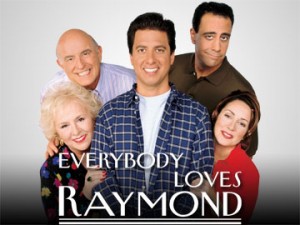I learned that Sit-Coms just spit it out. On one episode of Everybody Loves Raymond, Raymond’s brother Robert comes over to take the kids to the zoo. Raymond realizes that the kids might even like Uncle Robert more than him. Robert actually spits it out: You’re not a good father.
Of course, in a sit-com, all you’ve got is the dialogue. Like movies, you can’t get in the characters’ heads, you only have dialogue and actions to make a point. Robert clearly expresses his opinion of Raymond’s parenting skills–in the dialogue.
Raymond, of course, retaliates and tells Robert that he needs to get a life.
Fast forward to the end: Raymond has had a successful (sorta) day at the zoo with the kids and comes home to find Robert in the hot tub with two hot chicks.
Robert: Looks like you are a good father.
Raymond: Looks like you got a life. I’d get in that hot tub with you, but I didn’t come prepared.
Robert: That’s OK, you can use my swim trunks, they are over there. (Beat. That means wait for the audience to get the joke and laugh and appreciate it.) Just kidding.

I learned that the emotional content in a sit-com is laid bare. Characters actually say what the theme of the story is. Here, it’s a two-fold question: Is Raymond a good father? Does Robert have a life outside his duties as uncle? The important moments along the character’s emotional arc are so obvious. And isn’t that nice for the writer? We don’t have to imply, infer, implicate. Just spit it out.
As a novelist, I know that I have more tools than a scriptwriter, so I can put some of the characters’ tensions, fears, and pains into interior dialogue, narrative sections and can use sensory details to fully flesh out a scene and create the right mood. But I’ve added a new tool: Just spit it out.
Timing is crucial. Above, I had the aside about the BEAT, the pause for the audience to get the joke. Sit-coms work because the actors and actresses have superb timing. One book on acting in sit-coms emphasizes the importance of the actor/actress following EXACTLY the script, especially in terms of punctuation. Where should the character hesitate, pause, speed up, scream, whisper–in short, the scriptwriter is allowed to direct the pacing and delivery of the dialogue.
I’ve taken a new look at my punctuation this week, with an eye to pacing the delivery of dialogue. Am I using silences, pauses, hesitations, stuttering, speeding up, etc. to create an extra layer of meaning, to make jokes work, or to characterize?
Good advice on making punctuation work. By the way, I love Everybody Loves Raymond.